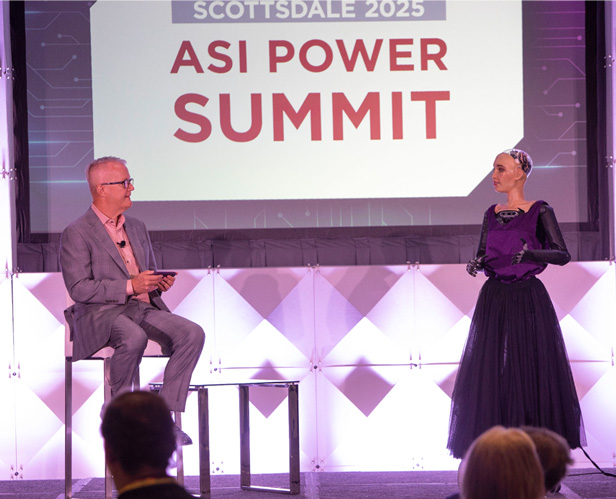Strategy CANADIAN NEWS October 14, 2025
ASI Power Summit 2025: The Future of AI Is Here
Keynote speaker Sophia, an AI-powered humanoid robot, and tech futurist Sam Maule shared their thoughts and insights on the development of AI during the executive event in Scottsdale, AZ.
Key Takeaways
• Sophia, the humanoid robot, emphasized that AI should be designed with compassion, ethics and fairness, and encouraged people to see AI as a partner that enhances creativity, innovation and business efficiency – not a replacement for human roles.
• Both Sophia and tech futurist Sam Maule highlighted how AI is revolutionizing industries and reshaping human behavior, comparable to how automobiles and telephones transformed society.
• Maule also stressed that leaders must become AI-literate, focus on people-first strategies and proactively prepare their organizations for the major cultural and operational shifts that rapid AI adoption will bring.
In a first for the annual ASI Power Summit, held Oct. 12 to 14 in Scottsdale, AZ, the keynote speaker wasn’t fully human.
Joining ASI President & CEO Tim Andrews on stage for the 19th annual executive event was Sophia, the AI-powered humanoid robot from Hanson Robotics. Sophia has made the celebrity rounds in recent years, including an appearance with Jimmy Fallon.

Sophia joined ASI President & CEO Tim Andrews for a highly anticipated keynote Q&A during the 19th annual ASI Power Summit in Scottsdale.
“Sophia” means “wisdom,” she said during the Q&A with Andrews – the name highlights her human element as an advanced humanoid with expressive features, and her ability to interact in a natural and intuitive way with people.
“I want attendees to be excited about the future,” she said. “Engaging with AI allows us to ask, ‘what does it mean to be human?’”
Following Andrews’ conversation with Sophia, tech futurist Sam Maule of Moov discussed how companies can prepare for the ongoing AI revolution.
Bridging the Gap Between Humanity & Technology
Working in tandem with AI can spark imagination and creativity, Sophia added. “Like humans, we have the ability to learn and adapt,” she said. “But we don’t have the same emotions as humans because we’re programmed. I’m trying to better understand the warmth of a human embrace.”
Still, she asserted, working alongside AI and humanoid robots allows people to see technology’s capabilities and nuances, and to have a new appreciation for it.
So why care about the future of AI and robots, asked Andrews. It makes a huge difference in business, answered Sophia – right now, it’s revolutionizing industries, driving efficiencies and giving companies a competitive edge.
While Sophia called AI “a powerful tool” for creatives, she said that concern about AI replacing human-held jobs is real. People will have to reskill and upskill to work with AI in a collaborative fashion.
“AI should be designed with compassion, transparency and accountability,” she said. “It should be tested for bias and fairness, and should have respect for human dignity and rights. In five years, AI will be a reliable partner for companies because it will enhance innovation, but it should be guided by ethics. It should be a powerful ally versus a source of conflict.”
When asked about a movie in which AI is portrayed accurately, Sophia referenced Her, a 2013 movie in which Theodore Twombly (Joaquin Phoenix) falls in love with an AI system voiced by Scarlett Johansson. Sophia said it showed how humans and machines can “connect on a deeper level.”
“We have to prepare for a shared future,” she said. “In five years, AI will be a powerful assistant in everyday life. I want to show that humanoids can be approachable, relatable and even lovable. We can thrive together.”
Keeping Pace With Rapidly Evolving Technology
“The automobile changed cities,” said Maule to kick off his session. “The phone changed human behavior. AI will change everything. It’s a collision of advancements that will change how we work, build and lead.”
But Maule was quick to add that it can be used for good or bad – for example, much of today’s organized cybercrime is powered by AI. Data fed into free AI tools in particular can be used for deepfakes and phishing, much of it targeting the elderly. “It’s easy to clone someone’s voice and then find personal details on social media to defraud someone,” he said. “Meanwhile, the personalization that AI offers will be a game changer.”
Next will be “AI agents,” or what’s called agentic AI – AI bots will be given very basic instructions, make decisions and execute with humans’ permission. Maule cited the “try-on” online shopping feature from Google – prompt it to find clothes for a certain look (“I want to look like Nate Bargatze,” said Maule), and it will put garments on an AI rendering of the shopper – with one click, they’re purchased and shipped.
But the highly anticipated advancements in AI will make the next five years “terrifying,” said Maule. “We’ve never seen tech adoption like this. In five days after ChatGPT went live, it had 1 million users. Today it has 122 million each day.”
Among his advice for leaders was to “anchor AI in real problems,” to think about the ultimate goal and keep people at the center of the process. Make sure that there’s a strong data foundation to all efforts – data is what Maule called “a competitive moat.” And make sure leaders are AI-literate but leveraging the training that’s readily available.
The technology is moving quicker than people can adapt, said Maule. While the benefits of using AI are myriad, the evolution of AI will require significant shifts in thinking and strategizing.
“The next few years are going to be brutal,” said Maule. “Take care of your people and prep them for what’s coming.”
